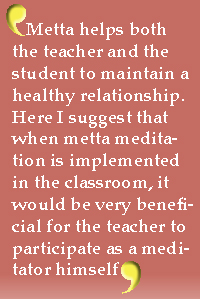|
Path to Nibbana - part 13:
Metta for teacher - student worthy relationship
 Battaramulla Battaramulla
Siri Sudassanarama
sadaham senasuna
Ven. Dr. Mirisse Dhammika thero
A point to emphasize is that it is important to concentrate fully on the person
you are directing a positive feeling towards while you meditate. This
concentration must be clear and the positive thoughts must be well focused. One
must clearly understand that thinking or just repeating the word “metta” is one
thing and practicing true metta, actively performing the metta, quite another.
It is noted in Visuddhimagga (translated by Nanamoli).
 For even if he developed loving-kindness for a hundred or a thousand years in
his way, ‘I am happy’ and so on, absorption would never arise. But if he
develops it in this way: ’I am happy. Just as I want to be happy and dread pain,
as I want to live and not to die, so do other beings, too’, making himself
example, then desire for other beings’ welfare and happiness arises in him. For even if he developed loving-kindness for a hundred or a thousand years in
his way, ‘I am happy’ and so on, absorption would never arise. But if he
develops it in this way: ’I am happy. Just as I want to be happy and dread pain,
as I want to live and not to die, so do other beings, too’, making himself
example, then desire for other beings’ welfare and happiness arises in him.
These feelings of meta, which I mentioned above, are known as “the profound
absorption”: it is a clear consciousness being united with the mind and the body
in metta. Therefore, until one reaches that state or profound absorption, the
meditator should not misunderstand that he follows true metta.
 After the mediation on oneself and one’s parents and family members, next comes
a metta meditation on one’s teachers. For some students in secondary school,
stresses are related to their teachers’ actions. The teaching method, workload,
the attitude of the teacher, and the interactions between the teacher and the
student can have a dramatic effect on how well the student performs.Because of
this, students need good relationships and understanding with their teachers.
Loving-kindness meditation will help them to have patience and understanding
towards, and positive relationships with, their instructors. After the mediation on oneself and one’s parents and family members, next comes
a metta meditation on one’s teachers. For some students in secondary school,
stresses are related to their teachers’ actions. The teaching method, workload,
the attitude of the teacher, and the interactions between the teacher and the
student can have a dramatic effect on how well the student performs.Because of
this, students need good relationships and understanding with their teachers.
Loving-kindness meditation will help them to have patience and understanding
towards, and positive relationships with, their instructors.
As the student develops positive relationships with her teachers, the student
may increase her feelings of trust toward them. Without trust, the student may
be reluctant to approach the teacher with questions or problems. The student
should also feel comfortable in disagreeing with the teacher in order to learn
properly. In a meaningful education, students should listen, read, write,
discuss, ask questions and engage in debates and so on.
For this, there should be a classroom environment which is safe, friendly, and
harmonious. To use one of my prior examples: we trust our doctors because they
are educated in medicine and have experience in treating illness. But when they
check our body, we should ask them questions in turn.
And we may disagree with our doctors’ recommendations. There is nothing wrong
with a patient disagreeing with his doctor, as long as it is done in a
respectful manner. Likewise with the students. Just as a doctor should not
discriminate against patients on the basis of gender, race, social status or
wealth, a teacher should make the effort to show metta towards all his students,
regardless of their backgrounds and individual differences in intelligence and
aptitudes.
Metta helps both the teacher and the student to maintain a healthy relationship.
Here I suggest that when metta meditation is implemented in the classroom, it
would be very beneficial for the teacher to participate as a meditator himself.
|
